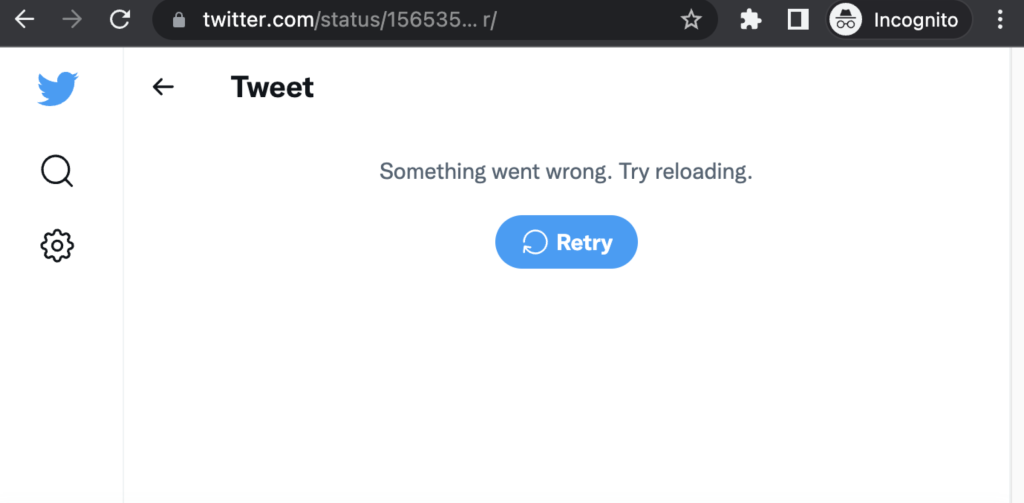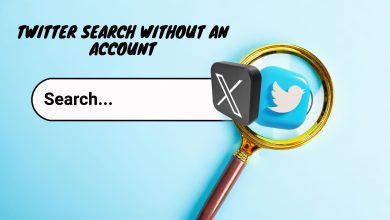How to Fix the ‘Something Went Wrong. Try Reloading.’ Error on Twitter
For Twitter enthusiasts who rely on the platform for all their information and news, any glitch in the app can seemingly bring their lives to a standstill. Unfortunately, some errors persist even after following the suggested fixes, such as the “Something went wrong. Try reloading.” Twitter message.

This error commonly occurs when accessing Twitter from a browser. The immediate assumption might be that the site is down. To verify this, you can check by connecting with people nearby or reviewing the application’s server status on sites like DownDetector. But if that’s not the case, you’ll need to investigate further. There are various factors that could be responsible for such an error message. Let’s examine them!
What causes the “Something went wrong” error?
While a slow or disrupted internet connection might trigger this issue, the “Something went wrong” message is a generic error that might not definitively point to a server timeout. The most common reasons behind the “Something went wrong. Try reloading.” Twitter message include:
- Internet Connection: A poor or slow internet connection can lead directly to the “Something went wrong” error on Twitter. The platform requires a stable connection to load content and refresh your feed. If your connection is weak, Twitter may have difficulty retrieving data, causing this error message.
- Browser Cache and Cookies: An overloaded or corrupted browser cache and cookies can trigger the “Something went wrong” error on Twitter. Over time, the accumulated data may conflict with Twitter’s most recent updates or cause the session data to become corrupted, preventing the site from loading correctly.
- Outdated Browser: An outdated browser may result in compatibility issues with Twitter, leading to the “Something went wrong” error. As Twitter regularly updates its platform, older browser versions might not accommodate these updates, causing problems with loading or functionality.
- Browser Extensions: Browser extensions can interfere with Twitter’s scripts, causing the “Something went wrong” error. Those that modify web content, block scripts, or change privacy settings could inadvertently disrupt Twitter’s normal functioning and prevent proper loading.
- Account-Specific Problems: The “Something went wrong” error can also be specific to your Twitter account, arising from issues related to account settings, permissions, or glitches in the account data. This might occur due to conflicts in settings or temporary issues affecting your account.
Now, let’s look at some solutions to address this error.
1. Check Your Internet Speed
The message implies a server timeout due to a disrupted connection or very slow internet speed. You can use tools like fast.com to check your internet speed. If the connection is indeed sluggish, try switching to a different network (from Wi-Fi to cellular or vice versa) or reset your router.
Here’s how to reset your router:
- Press the Power button on your router to turn it off.
- Unplug the router from the power source.
- Wait for about 5-10 minutes before plugging it back in.
- Turn it on and reconnect your device to the network.
2. Restart Your Computer
Restarting your computer is a simple way to close all applications and processes that might be affecting the browser’s functionality. This action also clears temporary data that could be the source of the issue.
Here’s how to restart your system:
- Click on the Start menu on the taskbar.
- Select the Power icon.
- Choose Restart from the options.
3. Clear Cache and Cookies
Accumulated browser data, meant to enhance user experience, can backfire and create conflicts leading to errors like the “Something went wrong. Try again.” Twitter message. A resolution is to clear the cache and cookies.
To do so in Google Chrome, follow these steps:
- Open Google Chrome.
- Press Ctrl + H to access History.
- Click on Clear Browsing Data on the top-left side of the screen.
- Select All Time as the time range and check all boxes, including Cookies and other site data and Cached images and files.
- Click on Clear Data.
For browsers other than Chrome, refer to our guide on how to clear cache on any Windows browser.
Additionally, it’s a good idea to clear your Twitter account’s cache, especially if you’re using the Twitter app rather than the web version. Below are the steps:
- Open Settings on your device.
- Select Apps.
- Scroll to and tap on the Twitter app.
- Navigate to Storage.
- Tap on Clear cache and/or Clear data.
4. Disable Browser Extensions
Despite their intended purpose to improve browser functionality, extensions can sometimes interfere with other operations, causing conflicts. Try disabling these extensions and see if it alleviates the issue.
To disable extensions in Google Chrome:
- Launch Chrome on your device.
- Click on the Extensions icon in the top right corner and select Manage Extensions.
- Disable the toggles for all extensions.
- If disabling extensions solves the problem, reactivate them one at a time to identify the one causing the issue, then remove it.
5. Update Your Browser
Using an outdated browser can lead to a plethora of issues. Stay protected and enjoy improved functionality by regularly updating to the latest version available. Chrome, for instance, does this automatically when instructed to. The steps below illustrate how to update Google Chrome:
- Open Google Chrome.
- Click on the vertical three dots icon in the top-right corner.
- Choose Help.
- Select About Google Chrome.
- Chrome will automatically search for and install any available updates.
- Restart the browser if prompted.
6. Try a Different Browser
It’s conceivable that your browser’s application files are corrupted or missing, causing functional inefficiencies. Alternatively, a persistent bug may be affecting your browser. A swift solution is to switch browsers. If the alternative browser accesses the site without problem, the issue is likely with the initial browser, not Twitter’s servers. Reliable options include Edge, Firefox, Chrome, Opera, among others.
7. Disable Antivirus Software (Temporarily)
If your antivirus software could be causing conflicts with Twitter, consider adjusting its settings or temporarily deactivating it. Please be mindful of the associated security risks when doing so.
To temporarily disable antivirus protection:
- Locate your antivirus program in the system tray.
- Right-click on it and select Disable Protection.
- Confirm the action if prompted.
Note: Be sure to reactivate the antivirus software after resolving the issue.
8. Wait It Out
If you’d rather not spend much time on troubleshooting or have exhausted all methods to no avail, consider waiting it out. Occasionally, the problem might be with Twitter’s system, and such issues are typically resolved soon by the platform’s technical team.
9. Contact Twitter Support
If all else fails, seek help from the Twitter Help Centre. Submit a report form and await their response. Their experts should address and resolve the underlying cause of the error.
Something Went Wrong Try Reloading Twitter - FAQs
When nothing is loading on Twitter, the issue may be with your internet connection. Check your speed and try other applications to ensure they’re working fine. Otherwise, consider signing out and back into your Twitter account, or reinstall the app altogether to resolve potential glitches.
To clear your app’s cache, press and hold the Twitter icon and choose ‘App info,’ then select ‘Storage.’ Finally, tap ‘Clear Cache’ or ‘Clear Data’ to clear the cache and other data.





